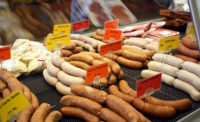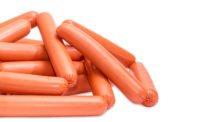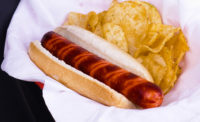Casings grab global audience




The market for casings and nettings is growing, according to suppliers of the materials used for sausage, roasts, hams and other protein products.
Industry estimates value the global market at nearly $5 billion with an annual growth rate of about 4 percent. Suppliers attribute the growing demand to population growth, changes in eating habits, urbanization and technological developments such as coextrusion of product and casing. Growth is particularly strong in developing countries. As a result, several plants recently started up or are under construction in China and Latin America.
Casings are either edible or non-edible and fall into five categories: natural, collagen, cellulose, fibrous and plastic, while netting may be based on cotton, elastic or polyester. Several supplier websites offer tools to assist in the selection of the right material and quantity. Many suppliers also provide related equipment and accessories.
Natural casings made from the gut of cows, sheep or hogs still dominate and are particularly popular in Europe. These edible casings can be pre-smoked and are commonly seen on products such as bratwurst and breakfast sausage.
A plant-based alternative to gut casings, alginate, is derived from seaweed (algae) and coextruded with the meat (see “A Compelling Case,” The National Provisioner, June 2014, p. 80). Alginate casings cost less than gut or collagen casings, and the coextrusion process can cut production costs. It also enables production of slimmer products with diameters of less than 10 mm. Maximum product diameter for alginate casings is about 32 mm, or hot dog/brat size.
Edible collagen casings appear to be gaining market share versus natural casings and often represent a cost savings. Collagen casings can be pre-smoked and are available in a wider range of diameters. Typically seen for jerky, brats, hot dogs, Polish sausage, Italian sausage and smoked sausages, collagen casings are commonly offered in clear, red or mahogany. Benefits include durability and good permeability for smoke.
Cellulose casings yield “skinless” products. Features include elasticity, consistent diameter and permeability. Diameters typically range from 21 mm to 36 mm for products such as hot dogs, frankfurters, knockwurst, smoked sausage and chorizo.
Fibrous casings are inedible and peeled away from products such as summer sausage, pepperoni, salami and boneless hams. Fibrous casings generally must be prepped in warm water before filling, but offer uniformity in size and length, a variety of diameters, colors and barrier properties plus good porosity for smoked products. Typically supplied in foot-long lengths, diameters range from about 1.5 inches to more than 5 inches. Common options include clear, mahogany, red and camouflage. Custom colors and printing also are available.
Plastic casings perform similarly, but tend to be unsuitable for smoked products. However, a new thermoplastic copolyester/nylon casing delivers the porosity needed to impart flavor and color during smoking. The patented material is said to be less expensive than gut, collagen or cellulose alternatives and eliminates the water and solvent consumption associated with cellulose production.
Netting may be tubular or flat and is supplied in sheet or roll form in numbered sizes. Several patterns are available, including stockinette for items such as picnic shoulders and whole turkeys and traditional styles with square holes. Various colors and smoke-compatible options can be specified. Peelability often is an important feature to minimize product waste when the netting is removed.
Looking for a reprint of this article?
From high-res PDFs to custom plaques, order your copy today!







